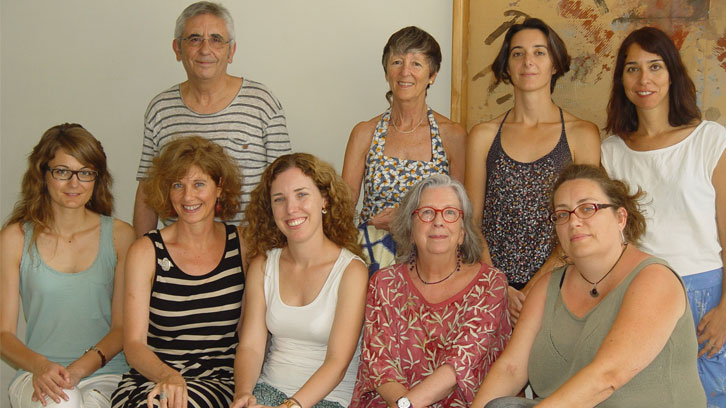Research Group in Plurilingual Interaction and Teaching (GREIP)

GREIP works on research–innovation to contribute to plurilingual education at all educational levels, with a global and inclusive approach from the perspective of interactional sociolinguistics (which considers that language is not limited to reproducing social structures, but also helps to create them), conversation analysis and socially situated knowledge. This group, comprised of researchers from the UAB and external collaborators, has experience in the study of language learning, plurilingualism, interculturality, the use of technology in education and, concretely, in teacher training.
This research group combines its international contacts with a strong involvement at the local level, working with researchers from other groups and maintaining a close relationship with schools and teachers, who are involved in research projects and engage in the creation of written materials and audiovisual products available to the entire educational community. These include classroom teaching materials and other resources to encourage debate and discussion on linguistic education.
GREIP was founded in the late eighties thanks to the efforts of Dr Amparo Tusón. It was then coordinated by Dr Luci Nussbaum until 2014 and today is run by Dr Melinda Dooly. Since its beginning, the group has carried out research projects with national and international funding and has trained numerous researchers in plurilingualism and education. Its members have participated as partners in local and international initiatives and as Principal Investigator on several projects.
GREIP has been recognised as a Consolidated Research Team by the Agency for Administration of University Grants and Research (AGAUR) of the Government of Catalonia since 2005. It also has a long tradition in the organisation of conferences, seminars, internal workshops –as well as with other research groups- and regular scientific sessions open to students.
Currently, the team consists of 11 members, 7 of whom are professors at the UAB: Melinda Dooly Owenby (principal investigator), Emilee Moore, Xavier Pascual i Calvo, Dolors Masats Viladoms, Luci Nussbaum Capdevila and Artur Noguerol Rodrigo, all members of the Department of Language and Literature Education and Social Science Education at the UAB Faculty of Education, and Amparo Tusón Valls, professor emeritus of the UAB Department of Spanish. Other members are Eulàlia Borràs Riba, professor at the School of Industrial Engineering of Igualada (EUETII, UPC); Laia Canals Fornons, editor of the portal elearningeuropa.info; Júlia Llompart Esbert, PIF fellow at the UAB, and Claudia Vallejo Rubinstein, GREIP’s research support technician.
In addition, a rich set of co-authors from universities around the world (Argentina, Australia, Cyprus, USA, Italy and the UK) are actively involved in their research, as well as 13 PhD students who are currently doing theses related to GREIP.
Research projects
GREIP’s main lines of research are: a) Plurilingual uses in the construction of knowledge and social relationships, b) linguistic socialisation in contexts of superdiversity, c) teaching by tasks and projects, using technologies for language learning and developing digital and audiovisual competences and telecollaboration. Based on these areas, and with the grant of public funds, the following research projects are being developed:
Knowledge for Network-based Education, Cognition & Teaching (Konect): Taking a research- action approach, this project proposes specific measures for improving primary and middle-school students’ communicative and academic skills in order to better ensure their responsible participation in our knowledge society.
Intercultural Bilingual Education (IBE) in The Impenetrable (Chaco, Argentina): detection, exchange and dissemination of educational and training experiences: It is aimed to have an impact on the most impoverished area of that region and give prestige to the EIB, understood as a resource promoting the improvement of living conditions of the indigenous population through education.
KOINOS. European Portfolio of Plurilingual Literacy Practices: The cornerstone of this project revolves around KOINOS (meaning "common" in ancient Greek), the European e-portfolio of plurilingual literacy practices. KOINOS takes the best experiences in linguistic diversity and education in Europe as a starting point in order to push them forward in facing 21st century realities.
Publications of the Research Group in Plurilingual Education and Interaction
Dooly, M. (2015) Networked classrooms and networked minds: Language teaching in a brave new world. In C. J. Jenks & P. Seedhouse (Eds.) International perspectives on the ELT classroom. Houndsmills, Basingstoke/New York: Palgrave MacMillan, 84-109.
Dooly, M. (2015) It takes research to build a community: Ongoing challenges for scholars in digitally-supported communicative language teaching. Calico Journal, 32(1): 172-194.
Dooly, M., & Masats, D. (2015) A Critical Appraisal of Foreign Language Research in CLIL, YLL and TELL in Spain (2003-2012). Language teaching: surveys and studies, 48(3): 1-30.
Dooly, M. & O'Dowd, R. (Series Eds.) (2015) Tcherepashenets, N. (Ed.) Globalizing On-line: Telecollaboration, Internationalization and Social Justice. Telecollaboration in Education, vol. 4. Bern: Peter Lang.
Moore, E. (2014) Constructing content and language knowledge in plurilingual student teamwork: Situated and longitudinal perspectives. International Journal of Bilingual Education and Bilingualism, 17: 586-609.
Moore, E. & Nussbaum, L. (2014) Building a multilingual university in institutional policies and everyday practices. In Unger, J. W., Krzyżanowski, M. & Wodak, R. (Eds.) Multilingual Encounters in Europe’s Institutional Spaces (pp. 243-269). London: Continuum.
Moore, E. & Patiño-Santos, A. (2014) Plurilingual resources for ‘welcoming’ at a university service for international students. Journal of Multilingual and Multicultural Development, 02/2014; 35(4).
Nussbaum, L. & Unamuno, V. (2014) Luces y sombras de la educación plurilingüe en España y América Latina. In C. Lomas (Ed.) La educación lingüística, entre el deseo y la realidad. Competencias comunicativas y enseñanza del lenguaje. Barcelona: Octaedro.
Tusón, A. (2015) El estudio del uso lingüístico. In C. Lomas (Ed.) Fundamentos para una enseñanza comunicativa del lenguaje. Barcelona: Graó, 25-74. Catalan edition: L’estudi de l’ús lingüístic. In C. Lomas (Ed.) Fonaments per a un ensenyament comunicatiu del llenguatge. Barcelona: Graó, 25-81.
Department of Language and Literature Education and Social Science Education

